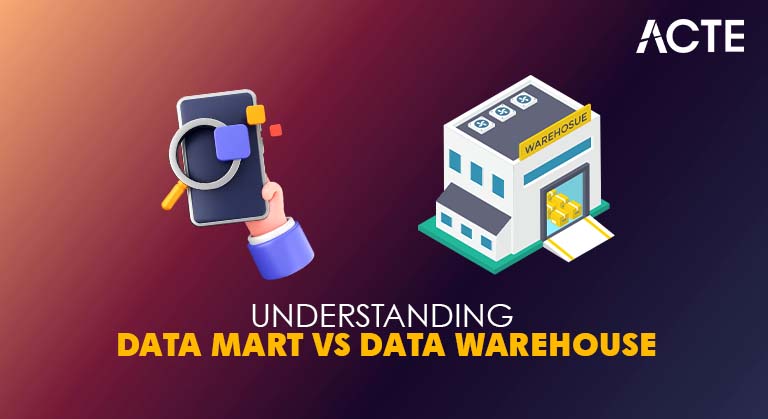
- Introduction
- What is a Data Mart?
- What is a Data Warehouse?
- Data Sources
- Data Volume and Scope
- Speed and Performance
- Implementation Cost
- Maintenance
- Use Case Examples
- Data Mart Types
- Conclusion
Introduction
In today’s data-driven environment, businesses require efficient ways to store, process, and analyze data. Data Mart vs Data Warehouse are two critical components of data modeling techniques, data architectures,While both are involved in data storage and retrieval for business analysis, they differ, and understanding these differences is a key part of comprehensive Database Training .significantly in their structure, scope, cost, data Volume and usability. Key Characteristics of Data Warehouses Understanding these distinctions is essential for organizations aiming to develop effective data management strategies.
Do You Want to Learn More About Database? Get Info From Our Database Online Training Today!
What is a Data Mart?
A Data Mart is a subset of a data warehouse, focused on a particular subject area or department, such as sales, finance, or marketing. t contains summarized and structured data that supports the analytical needs of specific user groups. Data Marts are optimized for speed and ease of access, often leveraging Top SQL Optimization Techniques to ensure efficient query performance often facilitating more rapid querying compared to large-scale data warehouses.
Key Characteristics of Data Marts:- Subject-specific focus
- Smaller data volumes
- Simplified architecture
- Faster deployment
- Cost-effective for individual departments
- Dependent Data Mart Extracted from a centralized data warehouse.
- Independent Data Mart Built directly from operational or external systems.
- Hybrid Data Mart Combines data from a data warehouse and operational sources.
What is a Data Warehouse?
A A Data Warehouse is an enterprise-wide data repository that integrates and stores data from multiple sources, and understanding its architecture and function is a core component of comprehensive Database Training. It is designed to support decision-making across the entire organization. Data is cleaned, transformed, and structured before being loaded into the warehouse

- Broad organizational scope
- Integrates multiple data sources
- Supports historical data analysis
- Requires complex ETL processes
- Structured for fast query performance
Data Sources
A Key Characteristics of Data Warehouses is a centralized system used to store and analyze large volumes of structured data from various sources. It supports business intelligence activities such as reporting and data analysis by providing a unified, historical view of data. Through the ETL process (Extract, Transform, Load), data is gathered from multiple sources and cleaned using data modeling techniques; Audit of the ETL Process Overview ensures accuracy, consistency, and reliability throughout each stage and stored in the warehouse. Designed to be subject-oriented, time-variant, and non-volatile, a data warehouse ensures consistency and accuracy. Common tools include Amazon Redshift, Snowflake, and Google BigQuery. Organizations use data warehouses to gain insights, make informed decisions, and track business performance over time efficiently.
Would You Like to Know More About Database? Sign Up For Our Database Online Training Now!
Data Volume and Scope
Data Volume:- Handles large-scale data (terabytes to petabytes).
- Designed for high-performance storage and retrieval.
- Optimized for read-heavy operations and complex queries.
- Scalable to accommodate growing business data over time.
- Integrates data from multiple sources (e.g., CRM, ERP, social media).
- Covers a broad range of subjects such as sales, finance, marketing, etc.
- Maintains historical data for trend analysis and forecasting.
- Supports enterprise-wide decision-making by offering a unified view.
Speed and Performance
Speed:- Optimized for fast query processing on large datasets.
- Uses indexes, partitioning, and materialized views to reduce response time.
- Pre-aggregated data and summaries improve report generation speed.
- Modern cloud warehouses use in-memory computing and parallel processing for faster execution, concepts that are increasingly emphasized in comprehensive Database Training .
- Supports high-concurrency—multiple users can run complex queries simultaneously.
- Query optimization engines ensure efficient execution plans.
- Workload management balances resources across users and tasks.
- Performance can be scaled horizontally (adding nodes) or vertically (upgrading hardware).
To Earn Your Database Certification, Gain Insights From Leading Blockchain Experts And Advance Your Career With ACTE’s Database Online Training Today!
Implementation Cost
Implementing a Data Mart vs Data Warehouse involves both direct and indirect costs that organizations must carefully consider. The initial setup includes expenses for hardware (or cloud infrastructure), software licenses, and integration tools. In traditional on-premise systems, costs can be significantly higher due to server purchases, network upgrades, and physical storage. In contrast, cloud-based data Key Characteristics of Data Warehouses like Snowflake, Amazon Redshift, or Google BigQuery often offer pay-as-you-go pricing, which can reduce upfront investment but may incur ongoing operational costs depending on data usage and query volume. Another major cost factor is data integration. The Extract, Transform, Load (ETL) process requires development time and specialized tools to clean and consolidate data—a key area of focus in Sql Server Certification programs. from multiple sources. Skilled personnel such as data engineers, architects, and analysts are needed, and their salaries form a significant portion of the budget.Training and change management are additional hidden costs. Teams must learn new tools and processes, which can temporarily reduce productivity. Also, maintaining and upgrading the warehouse over time involves continuous costs for support, Data Sources, data modeling techniques, and scaling.
Maintenance
Maintenance requirements vary:- Data Marts are easier to maintain but can become inconsistent if not aligned with centralized data governance.
- Data Warehouses require sophisticated maintenance for ETL pipelines, data validation, backups, and user access control—tasks typically overseen through a robust Database Management System.
- Independent Data Mart: Stand-alone, suitable for startups or specific departments.
- Hybrid Data Mart: Provides the flexibility of independent marts with the consistency of dependent marts, typically managed and queried using Sql And Mysql for efficient data handling.
- Data Marts are often managed by departmental IT teams, which may result in inconsistent security practices.
- Data Warehouses usually have centralized governance, offering robust user access management, audit logs, and compliance features.
- Sales: Product performance by region or season
- Marketing: Campaign effectiveness, customer segmentation
- Finance: Budget tracking, departmental spending
- Executive Dashboards: KPIs across departments
- Cross-Functional Analysis: Sales trends vs marketing initiatives
- Regulatory Reporting: Tax reporting, compliance metrics
Centralization in warehouses ensures consistent metadata, lineage, and security, which is critical for compliance.
Preparing for a Database Job? Have a Look at Our Blog on Database Interview Questions and Answers To Ace Your Interview!
Data Mart Types
Dependent Data Mart: Extracted from an enterprise data warehouse, ensuring consistency.

Centralized control in data warehouses is beneficial for industries with strict data regulations like finance and healthcare.
Use Case Examples
Data Mart Examples:Conclusion
Data Mart vs Data Warehouses serve complementary roles in an organization’s data strategy. While Data Marts provide quick, cost-effective access to focused data sets, Key Characteristics of Data Warehouses offer a holistic and integrated platform for enterprise wide analytics. Choosing between the two or combining both depends on organizational needs, budget, and long-term goals. Modern businesses often begin with departmental data marts and evolve toward integrated solutions a progression commonly covered in Database Training programs. data warehouses as analytical needs grow. Alternatively, some organizations adopt a lakehouse data modeling techniques, Data Sources merging the best features of both worlds.Ultimately, the right approach ensures data is accessible, reliable, and insightful, fueling better decisions across the enterprise.


